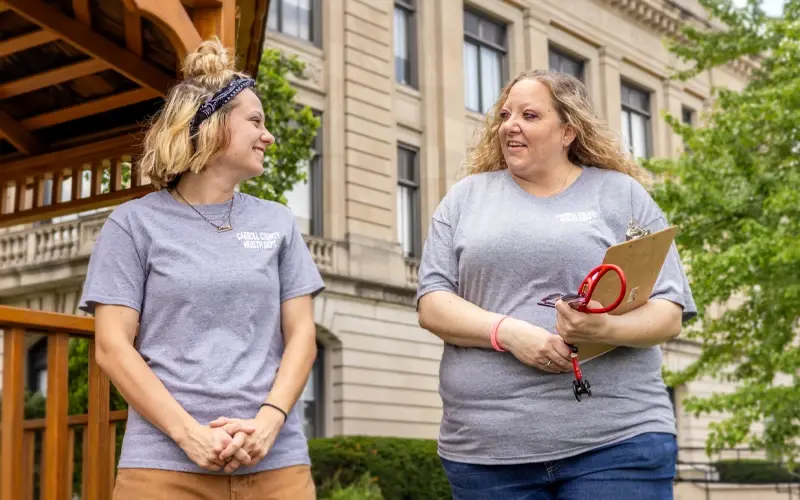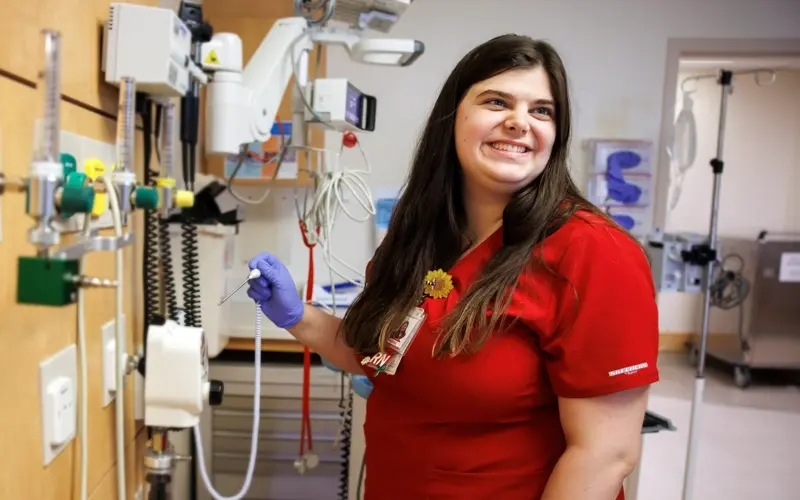Sharon Imes runs what she calls “a beautiful, well-oiled machine.” The IU R.N. to B.S.N. Degree Completion program takes experienced nurses with an R.N. or associate degree and, in one to two years, transforms them into stellar nurses with an elevated, wholistic view of nursing and healthcare. As Imes puts it, “With the bachelor’s degree we’re adding not just a baccalaureate education, but one from IU—a highly esteemed, rigorous degree.”
A national leader in nursing education, IU’s B.S.N. is powered by a collaborative consortium of all nine IU nursing campuses. The consortium administers the whole program of 18 courses, each overseen by a course leader dedicated to maintaining the course framework, curriculum, assignments, and evaluation tools. Each course is ready to go. When instructors want to teach a course, they simply personalize the syllabus and create introductory videos.
Connection makes it work
As program director, Imes provides statewide leadership in program planning, coordination, implementation, and evaluation. She is a Certified Nurse Educator with a clinical background in emergency and critical care nursing and expertise in leadership and policy. Her research focus: the impact of first impressions on the nurse-patient relationship and subsequent patient outcomes.
Imes puts her research into practice when teaching the first course of the program, Transitions to Baccalaureate Nursing. She explains that many of her students “are working nurses with as little as one, or as many as a dozen, years in the field. Their workplaces hold unprecedented challenges: short staff, high turnover, complex illnesses. Yet even though they’re rich in professional experience, many B.S.N. students have been away from the classroom for years and are unsure about what to expect.”
In Transitions to Baccalaureate Nursing, Imes ensures that students get a positive and welcoming first impression and that faculty sustain that connection throughout the semester with personal videos, emails, video messaging, and individual help.
Students benefit from this connection with faculty. Take Julia Hoskins, for example. Even as a child, she longed to be a nurse but was discouraged by people who told her she’d never be a nurse because of a comprehension disability. “[They told me] I lacked critical thinking skills.” She shared these concerns with her instructors. In return, they offered personal support. “All my professors were super understanding. If I needed help or had a question, they worked with me. They gave me their mobile numbers so I could call. These accommodations helped me get where I am today.”
Experience flows both ways
Imes notes that it’s not just faculty who add something special to the program. Learning flows from instructors to students and from students to instructors, creating a virtuous cycle of teaching and learning.
“Students bring to class discussions years of experience in specialties like OB, orthopedics, neurology, and ICU. They’re versed in healthcare systems and clinical practices that are not usually represented in a traditional classroom,” says Imes. “Their experience broadens the class beyond textbooks, assignments, and what I can teach them. I learn so much from our discussions.” Imes tells her students, “This is a journey for both of us. I work beside some of you in acute care. We’re all potential colleagues in the field. I lead the journey and impart knowledge and experience, but your experiences make the journey richer for everyone.”
Student Patrick O’Brien agrees. “Classmates’ experience in a variety of specialties and backgrounds introduced ideas I’d never thought of. The diversity of perspectives made discussion boards an important part of the class experience.”

Benefiting all Hoosiers
B.S.N. students like Hoskins and O’Brien contribute to the health and well-being of Hoosiers across the state.
Hoskins works for the Carroll County Public Health Department, where she heads the TB and communicable diseases areas. She’s also a case manager, and an emergency preparedness and school liaison. She says, “Through school I connected with professionals I never imagined talking to. I met with the Carroll County Local Emergency Planning Committee, and now I’m a member. I learned how to help schools get needed supplies. I connected county low-income birth projects, outreach programs, WIC, FSSA, and Mental Health America. I learned how to partner with the local fire, police, and ambulance corps. I have the B.S.N. to thank for this expanded network of professional contacts.”
O’Brien is the clinical nursing supervisor in the Renal Medical Unit at St. Joseph Regional Medical Center in South Bend. He heads a 32-bed unit as a charge nurse and supervises more than 100 employees. He oversees day-to-day processes, scheduling, hiring, firing, and patient satisfaction. “I’ve fallen in love with my job,” he says. “I’ve discovered I have a knack for leadership. The B.S.N. opened the door to a career that would have otherwise been off limits.”
“In whatever area students establish themselves,” says Imes, “you see a ripple effect of improvement. You improve the health of one family member, and the whole family thrives. You improve the health of one family and the community thrives. You open new professional vistas for students and ignite a passion for giving back."
Looking to the future
Imes sees growth ahead. “This program could easily outpace Purdue Global, Chamberlain, and Walden. Such growth is a testament to program faculty and course leaders. But the best marketing we have is our students.”


